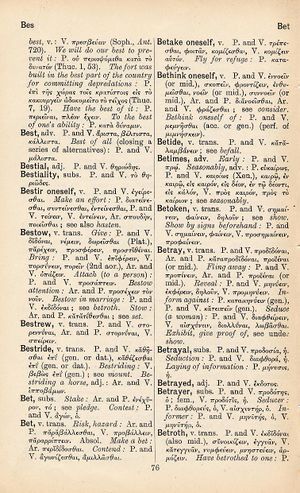betroth: Difference between revisions
From LSJ
οὕτως καὶ ἡ πίστις, ἐὰν μὴ ἔχῃ ἔργα, νεκρά ἐστιν καθ' ἑαυτήν → so even the Faith, if it does not have deeds, and is on its own, is dead | the Faith without works is dead
(Woodhouse 2) |
(CSV3) |
||
| Line 1: | Line 1: | ||
{{ | {{Woodhouse1 | ||
| | |Text=[[File:woodhouse_76.jpg|thumb|link={{filepath:woodhouse_76.jpg}}]]'''v. trans.''' | ||
P. and V. ἐκδιδόναι (also mid.), συνοικίζειν, ἐγγυᾶν, V. κατεγγυᾶν, νυμφεύειν, μνηστεύειν, ἁρμόζειν. | |||
<b class="b2">Have betrothed to one</b>: P. ἐγγυᾶσθαι (acc.). | |||
<b class="b2">Creon announces that he will betroth me to him who should discover the riddle of the wise maiden</b>: V. Κρέων . . . κηρύσσει [[ὅστις]] σοφῆς [[αἴνιγμα]] παρθένου μάθοι τούτῳ συνάψειν λέκτρα (Eur., ''Phoen.'' 47). | |||
}} | }} | ||
Revision as of 09:23, 21 July 2017
English > Greek (Woodhouse)
v. trans.
P. and V. ἐκδιδόναι (also mid.), συνοικίζειν, ἐγγυᾶν, V. κατεγγυᾶν, νυμφεύειν, μνηστεύειν, ἁρμόζειν.
Have betrothed to one: P. ἐγγυᾶσθαι (acc.).
Creon announces that he will betroth me to him who should discover the riddle of the wise maiden: V. Κρέων . . . κηρύσσει ὅστις σοφῆς αἴνιγμα παρθένου μάθοι τούτῳ συνάψειν λέκτρα (Eur., Phoen. 47).

